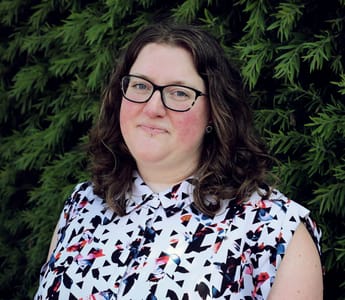
Sam van Zweden is a Melbourne-based writer interested in memory, food, mental health and the body. Her writing has been published by the Saturday Paper, The Guardian, ABC Life, Meanjin, The Big Issue, The Lifted Brow, Cordite, the Sydney Review of Books, The Wheeler Centre and others. Her debut book, Eating with my Mouth Open, won the 2019 KYD Unpublished Manuscript Award, and is available now.
Ahead of her Online Creative Non-Fiction Clinic and Workshop, The Basics of Non-Fiction, our Marketing and Communications Officer, Sarah Giles, sat down with Sam for an insider look into her process and practice.
What do you hope to find/feel when reading creative non-fiction?
I enjoy reading work that’s self-aware and a bit cheeky, which is a bit of a creative non-fiction trope, but it still really tickles me. I also love when the language in a work of creative non-fiction is able to lean into its poetic side just enough to build a scene the same way good fiction does. For a moment, I forget that I’m reading at all.
My own reading tastes tend toward stories of mental health and difficult embodiment. These are two things that are so hard to express because they’re surrounded by shame and they’re highly subjective. Stories that can speak those experiences in new ways can shift the way we think and talk about lived experiences – which has real and tangible effects on life outcomes for those living them.
Imagine you are staring at a blank page. It is time to begin work on something new. Where do you go searching for ideas and inspiration?
I’m just starting and I have plenty of time, I’ll do some ambient reading, viewing, and listening. I’ll tap into art other people have made about the subject I’m interested in, and notice patterns or ideas or the things that feel shiny to me.
My favourite place to search is in Brewer’s Dictionary of Phrase and Fable. This is a whopping great reference book that lists all kinds of common phrases, cultural references, mythology, and a bunch more. I’m fascinated by etymology (where words come from and how), so this particular reference text always sparks some interesting direction for me.
Regardless of where I’m looking, I always annotate a lot while I’m researching, and often those pages of notes form the start of my writing document – I’ll go in and start rearranging things that seem to belong together, fill out the gaps with other ideas, dispose of what no longer fits, until it starts to take the shape of an essay.
What are your top tips for pitching to publications?
Familiarise yourself with the publication before pitching. You want the editor to read your pitch and know that the piece belongs in their publication specifically.
Remember that the editor is human, and that you are human, too – approach pitching like a conversation, with kindness, realness and generosity.
How has your writing process evolved over the years?
I’m more comfortable now with just following an interesting idea, or allowing my intuition to tell me that two or more notions belong together and writing to figure out why.
Writing used to be much more about what I thought people wanted to read, but the more real I get with what’s interesting to me, the more I realise that this gives the writing life, and that’s what readers find engaging.
What can folks expect from your upcoming workshop on The Basics of Creative Non-fiction with Writers Victoria?
We’re going to dive into the ‘creative’ aspects of creative nonfiction and demystify the form. We’ll look at sources of inspiration – why you’re an expert, and where else you can look for the ingredients that make a well-rounded story. We’ll explore structure, too – what ideas go where, why it matters, and how to get a reader invested.
I’m so excited to meet the workshopping group and learn how creative non-fiction can work for them!
Places are still available for Sam’s Online Creative Non-Fiction Clinic and Clinic Workshop: The Basics of Non-Fiction. Members of Writers Victoria receive up to 37% off the full price of all clinics, workshops, seminars and courses. Writers experiencing financial and social barriers to developing their skills are encouraged to apply to The Writers Victoria Fund for subsidised attendance at workshops and clinics.
